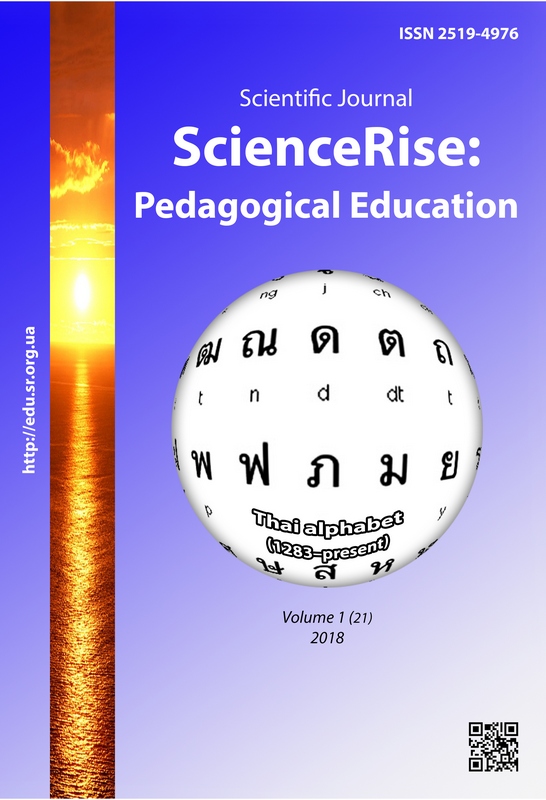Essence argumentation of the teacher professional development of higher school: theoretical aspects
DOI:
https://doi.org/10.15587/2519-4984.2018.121988Keywords:
development, professional development, teacher of higher education, professionally important qualities of a specialistAbstract
The article is devoted to the analysis of the content and essence of the phenomenon «teacher professional development of higher education», the study of which is currently relevant in the context of the search for new socially significant benchmarks in the system of higher education and new requirements for the competitiveness of future teachers. The authors state that scholars turned to various aspects of this problem, in particular, in terms of psychological peculiarities of personality development, the construction of a future teacher professional qualites, as well as self-development and self-realization of a teacher in the process of carrying out professional activities in higher education.
As a result of the analysis carried out by the authors, it became clear that the phenomenon of professional development can be considered as one of the foundations of pedagogical activity of a teacher of a higher educational establishment; in the writings of academic scientists, this phenomenon is represented as a process of formation a subject of professional activity and involves quantitative and qualitative changes in the psychological characteristics of the individual, as a result of various actions in the process of professional activity. A lot of studies, the professional development is considered in close connection with personal and professional development, which involves self-realization, an incentive to creativity, the need to design their own professional level at different stages of the life's path
References
- Vygotskiy, L. S. (2005). Psikhologiya razvitiya cheloveka [Psychology of Human Development]. Moscow: Smysl; Eksmo, 1136.
- Zeer, E. F. (2015). Teoretiko-prikladnye osnovaniya psikhologii professionalnogo razvitiya [Theoretical and Applied Grounds of the Psychology of Professional Development]. Yekaterinburg: Izdatelstvo Rossiyskogo gosudarstvennogo professional'no-pedagogicheskogo universiteta, 194.
- Maksymenko, S. D. (2016). Poniattia osobystosti u psykhologhii [The concept of personality in psychology]. Psychology and personality, 1, 11–17.
- Leontev, A. N. (1959). Problemy razvitiya psikhiki [Problems of development of the psyche]. Moscow: Izdatelstvo Akademii pedagogicheskikh nauk RSFSR, 345.
- Vozniuk, O. V., Dubaseniuk, O. A. (Ed.) (2016). Kontseptsiia osobystosti pedahoha yak model produktyvnoi profesiinoi diialnosti [Concept of the personality of the teacher as a model of productive professional activity]. Akmedosiahnennia naukovtsiv Zhytomyrskoi naukovo-pedahohichnoi shkoly. Zhytomyr: Vydavnytstvo ZhDU im. I. Franka, 107–134.
- Ficula, M. M. (2006). Pedaghoghika vyshhoi shkoly [Pedagogy of high school]. Kyiv: Akademvydav, 352.
- Gluzman, A. V. (2001). Universitetskoe pedagogicheskoe obrazovanie: osnovnye polozheniya kontseptsii [University pedagogical education: the main provisions of the concept]. Problemy suchasnoi pedahohichnoi osvity. Seriia Pedahohika i psykholohiia, 3 (1), 9–14.
- Panova, N. V. (2009). Lichnostnoe razvitie pedagoga v nepreryvnom professionalnom obrazovanii [Personal development of a teacher in continuous vocational education]. Akademicheskiy vestnik Instituta obrazovaniya vzroslykh Rossiyskoy akademii obrazovaniya, 1 (18), 58–62. Available at: http://obrazovanie21.narod.ru/Files/2009-1_p058-62.pdf
- Pshenychna, L. V.; Sbruieva, A. A., Kozlova, O. H. (Eds.) (2014). Skladovi profesiinoho prostoru maibutnoho vykladacha. [Components of the professional space of the future teacher]. Teoretychni ta metodychni zasady mahisterskoi pidhotovky vykladacha vyshchoi shkoly. Sumy: Vydavnytstvo SumDPU im. A. S. Makarenka, 286–312.
- Seheda, N. A. (2011). Fenomenolohiia rozvytku liudyny v osvitnikh modeliakh [Phenomenology of human development in educational models]. Naukovyi visnyk Melitopolskoho derzhavnoho pedahohichnoho universytetu imeni Bohdana Khmelnytskoho. Seriia: Pedahohika, 6, 53–61.
- Kremen, V. G. (Ed.) (2008). Encyklopediia osvity [Encyclopedia of Education]. Kyiv: Yurinkom Inter, 1040.
- Kodzhaspirova, G. M., Kodzhaspirov, A. Yu. (2005). Slovar po pedagogike [Dictionary of Pedagogy]. Moscow: IKTs «MarT»; Rostov on Don: Izdatelskiy tsentr «MarT», 448.
- Frolov, I. T. (Ed.) (2001). Filosofskiy slovar [Philosophical dictionary]. Moscow: Respublika, 719.
- Mitina, L. M. (2014). Psikhologiya lichnostno-professionalnogo razvitiya subektov obrazovaniya [Psychology of personal and professional development of subjects of education]. Moscow-Saint Petersburg: Nestor-Istoriya, 376.
- Syniavskyi, V. V. (2014). Profesioghramy i psykhoghramy profesii pedaghoghichnogho spriamuvannia [Professiograms and psychograms of professions of pedagogical direction]. Kirovoghrad: Imeks-LTD, 84.
- Rybalka, V. V. (2013). Psykhologhiia i pedaghoghika praci osobystosti [Psychology and pedagogy of personality work]. Kyrovoghrad: Imeks-LTD, 136.
Downloads
Published
How to Cite
Issue
Section
License
Copyright (c) 2018 Halyna Sotska, Vadim Lisoviy

This work is licensed under a Creative Commons Attribution 4.0 International License.
Our journal abides by the Creative Commons CC BY copyright rights and permissions for open access journals.
Authors, who are published in this journal, agree to the following conditions:
1. The authors reserve the right to authorship of the work and pass the first publication right of this work to the journal under the terms of a Creative Commons CC BY, which allows others to freely distribute the published research with the obligatory reference to the authors of the original work and the first publication of the work in this journal.
2. The authors have the right to conclude separate supplement agreements that relate to non-exclusive work distribution in the form in which it has been published by the journal (for example, to upload the work to the online storage of the journal or publish it as part of a monograph), provided that the reference to the first publication of the work in this journal is included.







